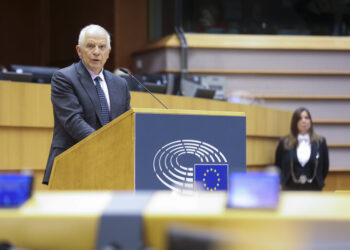Brussels – While the European Union raises the alert level to the highest level on the risks of disinformation, information manipulation and foreign interference in the run-up to the European elections, several member states have not yet implemented the measures decided two years ago against public enemy number one: Russia and its online propaganda channels. Sputnik, Russia Today and their subsidiaries are still active in several capitals. Even in Brussels, they are reachable from the European Commission press room.
Since the start of Russia’s war of aggression in Ukraine, the EU has suspended the broadcasting activities and licenses of several Kremlin-backed disinformation organs. As early as March 1, 2022, the EU Council banned Russian state media Sputnik and RT (formerly Russia Today) and their subsidiaries from broadcasting in the EU. They were gradually joined then by another dozen channels used by the Kremlin to “intentionally spread propaganda and conduct disinformation campaigns, including on its military aggression against Ukraine.”
The bans imposed by the EU cover all means of transmission and distribution in or to member states, including cable, satellite, Internet TV, platforms, websites and apps. But, as stressed today (May 8) by a spokeswoman for the EU executive, Francesca Dalboni, “the enforcement of this decision, like any other sanctioning decision, comes under the competence and responsibility of the Member States.” That is, it is up to the competent national authorities to take measures to implement the ban and enforce it.
While some countries such as Bulgaria, Germany, Estonia, Lithuania, Latvia, and Poland had already imposed national operators to block Russian media before the 27 countries decision, and others such as Austria, Cyprus, Greece, Ireland, and Romania quickly made sure that the sanctions were enforced, in other member states it is still possible to read Sputnik, RT, and other Kremlin megaphones. This is the case in Belgium, for example, with the paradoxical consequence that some of these sites are still usable in the buildings of the very European institutions that banned them.
Just today, the European Commission, together with the body that brings together the 27 independent national regulatory bodies for audiovisual services (ERGA), launched a joint communication campaign to “inform citizens of the risks associated, encourage critical thinking, and provide practical advice on how to detect and combat misinformation.” The campaign video will be broadcast in all member states and available in the 24 official EU languages until early June.
“For our part, we will continue to support the member states by providing guidance to ensure uniform implementation throughout the EU,” the European Commission spokeswoman said again during the daily press briefing, recalling that, as the “guardian of the treaties,” the EU executive can initiate infringement procedures against those governments that fail to comply with decisions adopted unanimously. Beyond any judgment on the need to black out websites deemed dangerous, the fact is that we are thirty days away from the most disinformation-prone European election ever. And that the EU is on high alert, even more so after the case of the online newspaper The Voice of Europe and the attempted undue influence on the European Parliament. However, to protect itself, it does not find good allies in all member countries.
English version by the Translation Service of Withub






